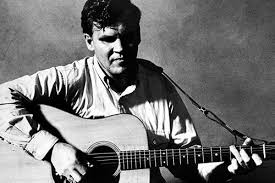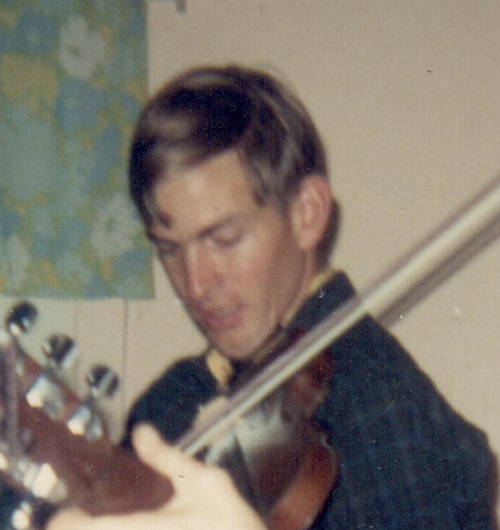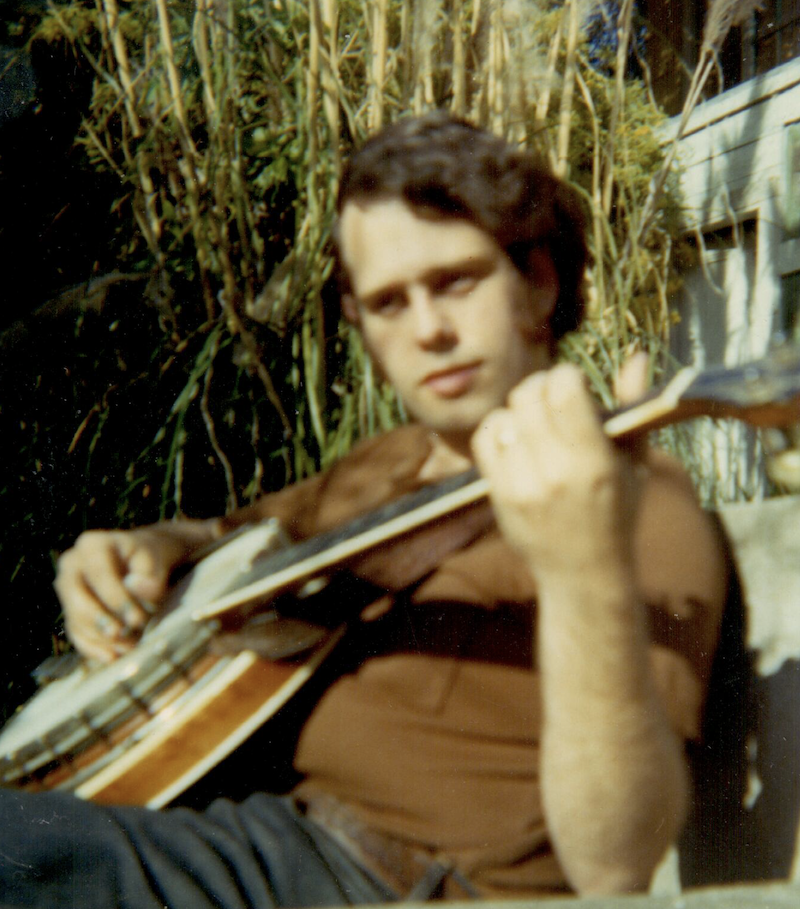Picking with Doc and Hank
an excerpt from my memoir, Saturday Morning
by Rick Shubb
At a folk music camp called Sweet’s Mill, in the foothills of the Sierras, my friend Hank Bradley, just a few years older than me but already becoming known as a topnotch old-time fiddler, introduced me to Doc Watson. Doc liked the way Hank and I played fiddle tunes, and of course Doc loved to play fiddle tunes on the guitar. No one has ever played them better.

We spent some time playing together just for pure joy. Doc liked our sound so well that he asked us to join him for several of the shows on his west coast tour. He was performing as a solo then, but near the end of each of his sets he invited Hank and me onto the stage and we’d close the set with three or four fiddle tunes. We never knew which tunes Doc would feel like playing until it was time to do them, but we had practiced quite a few of them, and we were ready. Often he would ask Hank to suggest the tune, in the old-time, fiddle-centric tradition.
We played some college concerts, the Jabberwock coffee house in Berkeley, and went all the way down to Los Angeles to play several nights at the famous folk club, the Ash Grove. Our Friday and Saturday with Doc Watson at the Jabberwock was the last gig at that club before it closed down for good. We played the last notes ever heard on that stage.
Bill Ehlert, a large, gregarious fellow better know as the Jolly Blue Giant (he always wore a blue work shirt), or simply Jolly for short, had been the owner and manager of the newly defunct Jabberwock. We invited him to come along with us for the rest of the tour.
The following night we would play a concert at Stanford University, and Ed Littlefield, Jr. was going to play rhythm guitar with us. Our whole entourage was invited to Ed’s family home in Palo Alto, where we were treated to a sumptuous feast. The dinner was so lavish that some of us decided to have an eating contest. Doc, Hank, Jolly and I were going toe-to-toe through most of the courses, but slowing down as dessert drew near.

Our hosts offered us the choices for dessert: “We have pie, cake, and ice cream.” In turn, Hank, Doc, and I each held our stomach, groaned, and declined. When it came to Jolly he smiled and said, “That sounds like a winner,” and ate all three.
When we were playing with Doc Watson, it was during the 60s folk boom. Doc had just recently been “discovered.” He was the next big thing, and to some fans he seemed too good to be true. They wondered if his charming, down-home personality he projected from the stage was genuine, or if he was putting it on. Well, I can tell you, it was the real Doc. But to judge him as a country bumpkin would be a mistake. He was an extremely intelligent man, and aware of his image. Folk fans then were caught up in the question of “authenticity,” whatever that meant. Doc once confided in me, “Son, I’ve listened to too many classical and jazz records to be authentic.”
Doc, Hank and I made a living room tape of about a dozen fiddle tunes, backed up by my old pal, Sandy Rothman, on rhythm guitar, and recorded by Alan Oakes using professional quality equipment. Doc submitted it to his record label, Vanguard, as a demo for a proposed LP. They rejected it, probably because Doc was not featured as prominently as they wanted. Not surprising, for at the time Doc was still a rising star, and they wanted him showcased in a certain way. Too bad for us, though. It would have been quite a feather in our caps to be on an album with Doc Watson.

And too bad in another way, because to me, these sessions captured Doc’s guitar playing at its best ever. He was right in his element, as loose as a goose, taking chances, and having fun. He explored nuances within the old melodies that others missed. And now and then he would insert playful comments. During my banjo break on one of the alternate takes, he shouted “Play it, Rick! Play it boy!” If it had been up to me, I’d have used that take, just for that reason.
Early one evening we were at a friend’s apartment rehearsing for a concert. Doc, Hank, and I were playing, and several other old-time musicians were there, too, including mandolinist Kenny Hall; another blind guy whose unique playing style made him a legend among his peers. Kenny used a bowl-back mandolin that he held vertically on his knee like a ventriloquist’s puppet. Instead of a pick he used his fingernail. Just in case you don’t know, all of that is extremely eccentric, but besides being weird he was also very good. This was a high quality jam.
When it came time for us all to head out to the gig, everyone began getting their coats, picking up their instrument cases, and heading down the long flight of stairs from the second floor apartment. At the bottom of the stairs, Hank began to laugh. “Look at this,” he said, indicating that Doc and Kenny were each touching the other’s arm, “they both thought they had ahold of someone who could see.” The pair had swiftly navigated the steep staircase without incident, a literal case of the blind leading the blind.
Here are a couple of tunes from the demo tape:
